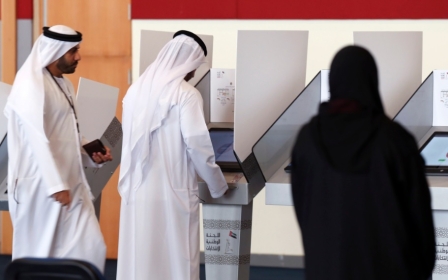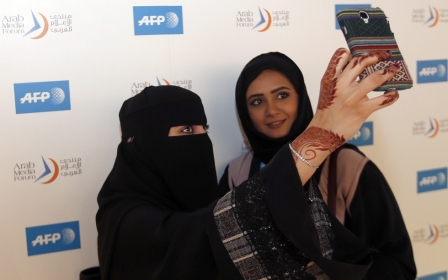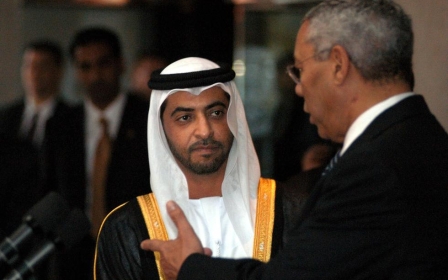UAE paid PR firm millions to brief UK journalists on Qatar, Brotherhood attacks

The UAE paid a London-based public relations firm millions of pounds to lead attacks in the UK against Qatar, the Muslim Brotherhood, and other opponents of the Gulf state, according to a Mail on Sunday investigation.
The report reveals that Abu Dhabi paid Quiller Consultants £60,000 ($93,000) per month for six years to, among other things, brief leading British journalists who launched an extraordinary campaign accusing Qatar of funding terrorism.
The PR firm also lobbied the British government to hold a review into the activities of the Muslim Brotherhood and, separately, briefed an influential journalist to target the author of this article, who at the time had raised allegations of human rights abuse in the UAE.
Quiller Consultants was co-founded in 1998 by Lord Hill, a close associate of Prime Minister David Cameron, and the firm’s staff include former British officials and ex-national newspaper journalists.
The UAE contract, seen by the Mail on Sunday, stated that Quiller would work in the UK “to promote and achieve the foreign policy objectives of the UAE”, adding “all the activities as part of this engagement will be carried out in strict confidence".
Investigative reporter David Rose said he has seen emails that prove Quiller “successfully targeted top British newspapers” and “kept the UAE’s involvement secret”.
Emails between senior UAE officials and Quiller reveal how Abu Dhabi insisted their lobbying must remain secret out of fear they would be shown to be “meddling in UK domestic affairs".
The key Quiller consultant who worked on the UAE contract was ex-senior Foreign Office official Gerard Russell, who was picked by former prime minister Tony Blair to head up the UK’s Arab media unit after 9/11.
Russell no longer works for Quiller but according to the Mail has remained active in the political sphere. The report stated that he attended meetings this year between Blair and Hamas chief Khaled Meshaal.
On the UAE side, the key conduit for Quiller was Simon Pearce, a British expat who is in charge of Abu Dhabi’s overseas image. He is also a director at the UAE-owned Manchester City Football Club.
Pearce sent emails to Khaled bin Mohammed bin Zayed - son of Abu Dhabi Crown Prince Mohammed bin Zayed - who was in charge of shutting down UAE political opposition group Islah, a Muslim Brotherhood-linked organisation.
Also copied in on the messages were UAE Foreign Minister Anwar Gargash and Abu Dhabi investment fund head Khaldoon al-Mubarak, who is also chairman of Manchester City.
In one email Quiller consultant Russell wrote to his bosses in London and Abu Dhabi telling them that he had passed information to the Sunday Telegraph’s Andrew Gilligan.
Russell wrote to Gargash immediately after meeting Gilligan and said: “We explained we were not acting for the UAE in seeing him, and that indeed the UAE had no knowledge of the meeting.”
Mr Russell has since indicated to Middle East Eye that at the relevant time Mr Gilligan knew that the UAE was a client of Quiller’s and that that fact was recorded in the APCC register. Mr Russell has further stated that on this particular occasion he was not acting at the request or with the knowledge of his UAE client and so he made that clear to Mr Gilligan.
After Gilligan published an article accusing Qatar of funding terrorism, Pearce sent an email to Khaled bin Mohammed and Gargash.
The subject line read “Boom!” and said: “Your highness, Dr Anwar, I thought you should see this – latest product of our efforts – should be a game-changer for UK understanding – more to come.”
In Russell’s email to Gargash after meeting Gilligan he had written: “We propose we continue to develop the relationship with Gilligan and pass him material on a regular basis.”
The Telegraph then embarked on a two-month campaign against Qatar in which they published 34 articles, including eight front-page headline stories, that accused Doha of financing terrorism. At the same time the Telegraph’s billionaire owners, the Barclay brothers, were engaged in a fierce dispute with Qatar over the ownership of three five-star London hotels.
Gilligan was the author of many of the anti-Qatar articles, as was the Telegraph’s Robert Mendick.
Gilligan was singled out by Quiller as a journalist who would not write anything negative about the UAE because of his role as a paid advisor to London Mayor Boris Johnson.
Johnson visited the UAE in 2013 and joked that in London he felt he was the mayor of the UAE’s eighth emirate.
Briefings against Qatar were only a part of Quiller’s work for the UAE. Russell said in emails that he wanted to lobby journalists viewed as sympathetic to the Muslim Brotherhood, which is considered a terrorist organisation by the UAE.
Russell wanted to meet Roger Boyes from The Times, who he said appeared “sympathetic to the Brotherhood”.
Russell said he would convince Boyes that the Brotherhood were not “moderates” but “extremists who in the long term caused radicalisation”.
Pearce, however, was cautious in how far Russell should go in his work, worried that the UAE’s lobbying activities may be found out.
“The elements are there to create an impression that we are meddling in UK domestic affairs,” he wrote, according to the Mail.
Diplomatic sources have previously said that pressure from the UAE and Saudi Arabia led to the UK announcing a review into the Muslim Brotherhood last year, despite London having previously viewed the group “as an organisation we can do business with”.
The overdue Brotherhood review is rumoured to have been buried by the British government because its head - Sir John Jenkins - did not propose to ban the group, which is likely to anger Abu Dhabi.
The UAE has vigorously pursued the Muslim Brotherhood and its affiliates across the Middle East and North Africa. Abu Dhabi backed the 2013 military coup in Egypt that removed elected Brotherhood leader Mohammed Morsi from power and replaced him with army chief Abdel-Fattah al-Sisi.
Domestically Abu Dhabi has also locked up scores of Brotherhood affiliated activists, who were linked with calls for the Gulf state to implement far-reaching democratic reforms. Human Rights Watch and Amnesty International have reported that these Emirati political prisoners have been tortured – an allegation UAE authorities have fiercely denied.
The Mail on Sunday reported that part of Quiller’s work in London was to combat the author of this article, who in 2013 headed up a human rights group that focused on the UAE.
Russell claimed in an email that he had passed information to Gilligan aimed at discrediting the work of the Emirates Centre for Human Rights.
After Gilligan had published an article accusing the author of terrorist links, Russell wrote to his UAE bosses and said: “I plan to send you a proposal that explains how we can do more of this kind of work, and build on the relationship with trusted journalists in future. I think Simon Pearce may be interested in the fact we have had this meeting: should I let him know?”
Pearce, the Mail reported, was very interested.
The UAE’s contract with Quiller expired on 1 August this year.
None of the UAE officials featured in the report responded to the Mail’s request for comment.
Middle East Eye propose une couverture et une analyse indépendantes et incomparables du Moyen-Orient, de l’Afrique du Nord et d’autres régions du monde. Pour en savoir plus sur la reprise de ce contenu et les frais qui s’appliquent, veuillez remplir ce formulaire [en anglais]. Pour en savoir plus sur MEE, cliquez ici [en anglais].




